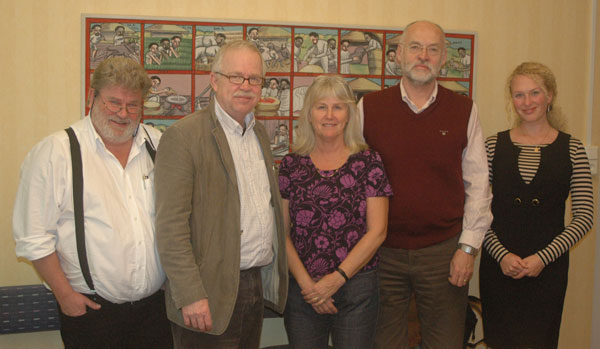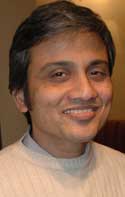SWEDISH SOUTH ASIAN STUDIES NETWORK
Epidemiology and Public Health Sciences, Umeå International School of Public Health, Umeå University
Postal address: Enheten för Epidemiologi,
Institutionen för Folkhälsa och klinisk medicin, Umeå
University, SE-901 85 Umeå, Sweden
Visiting address: Umeå University Hospital, building
9
Fax: +46 (0)90 13 89 77
Web page: http://www.umu.se/phmed/epidemi/
Contact person: Associate Professor Lars Lindholm, phone: +46 (0)90 785 29 34
 |
| From left to right: Lecturer Anders Emmelin, Senior lecturer Curt Löfgren, PhD Candidate Kjerstin Dahlblom, Professor Stig Wall and Dr. Yulia Blomstedt. |
Epidemiology is a unit within the Department of Public
Health and Clinical Medicine, with approximately 50 staff members and
research students. The Epidemiology unit provides opportunities for graduate
education and research in diverse
fields of epidemiology and public health, accepting individuals from
a variety of professional and academic backgrounds including those with
experience from the health area. The Epidemiology unit is involved in
research and research training in collaboration with a number of universities,
departments or NGOs in Africa, Asia, Central America and the United
States. This is an important part of the unit’s profile, which
has been possible by grants from Sida/SAREC and STINT.
In addition to research training courses and individual tutorials, internal
seminars constitute an important part of the PhD-programme.
The Epidemiology unit is also responsible for Umeå International
School of Public Health, where an international public health
training programme including a Masters’ programme is offered.
Since 1991 more than 800 students from 30 countries have taken part
in any of the courses offered by the unit, many from South Asia. Every year, the
Master programme in Public Health normally includes students from
Bangladesh, India, Nepal and Pakistan.
Besides more than 400 International students have participated in the yearly
three-weeks Summer course on ”Epidemiology and Field Research
Methods”.
More information on the courses.
 Since October 2003 the Division is a Collaborating Centre
to the World Health Organization on “Epidemiological Surveillance
and Public Health Training”. This is a major recognition of our
international collaborative efforts and which potentially adds to the
visibility and sustainability of the research and training activities
carried out.
Since October 2003 the Division is a Collaborating Centre
to the World Health Organization on “Epidemiological Surveillance
and Public Health Training”. This is a major recognition of our
international collaborative efforts and which potentially adds to the
visibility and sustainability of the research and training activities
carried out.
Umeå University’s Unit for
Epidemiology and
Public Health Sciences runs the Swedish Research School for Global Health – a partnership between Umeå University and Karolinska Institutet that has received financial support from the Swedish Research Council. The support provides infrastructure for implementing better and improved research training in global health, focusing on global diseases such as HIV/AIDS, tuberculosis and malaria. In addition, the two partner universities have joint undergraduate and master's programs in global health. Recently both universities have created Centres for Global Health to provide a platform to focus on research on global health, concentrate resources and provide possibilities for making a contribution in reducing global poverty. Professor Stig Wall is Director for the Centre for Global Health in Umeå. ![]()
A doctoral programme is still in the process of development. The first recruitment should take place during late spring 2008. Postgraduate students who are offered a position in the programme must be enrolled in and receive funding from their home departments. Thus, the Swedish Research School in Global Health serves as an umbrella organisation for interdisciplinary encounters – through seminars, courses and workshops – and gives students access to both national and international networks.
From 2009, a new 2-year Master of Public Health Degree has also been launched by the Umeå International School of Public Health. The Masters degree equips public health practitioners and researchers with the skills required to understand, and ultimately help improve and maintain, the health status of the population. More information.![]()
Research connected to South Asia:
The department was involved in the major long-term research and research training project on Early Child Health in Lahore carried out during the years 1976 to 1995 in collaboration with several other Swedish and International departments, with support from Sida/SAREC. More information about the Lahore project.
Associate professor Lars
Lindholm is a health economist. He has done studies
on equity in health economic evaluation and the use of epidemiological
data in the distribution of health care resources. Lindholm is involved
in the Network for Interventions against Maternal-Child Malnutrition
in South Asia, initiated by Prof. Lars Åke Persson, International
Maternal and Child Health, Department of Women’s and Children’s
Health, Uppsala University. More information on the network.
Lars Lindholm is involved in one research project on • ”Health
economics for developing countries”,
and another one on • ”Combined
interventions against maternal depletion and low birth weight in Bangladesh
isues of cost-effectiveness compliance and equity”.
PhD candidate Rubina Shaheen from Bangladesh is working on health economics analysis of nutrition interventions in pregnancy and effectiveness in improving size and health at birth of the offspring.
 MSc Md.
Showkat Gani has worked for more than seven years
as a Research Associate at BRAC
Research and Evaluation Division (a division of BRAC conducting
multidisciplinary research on various development issues and subjects
of national and international importance since 1975) in Dhaka, Bangladesh.
From 2006/07 Mr. Gani has been one among many South Asian students at the Masters programme
in Public Health in Umeå.
MSc Md.
Showkat Gani has worked for more than seven years
as a Research Associate at BRAC
Research and Evaluation Division (a division of BRAC conducting
multidisciplinary research on various development issues and subjects
of national and international importance since 1975) in Dhaka, Bangladesh.
From 2006/07 Mr. Gani has been one among many South Asian students at the Masters programme
in Public Health in Umeå.
He participated in the SASNET workshop on ”The
role of South Asia in
the internationalisation of
higher education in Sweden” held in Stockholm 29-29 November
2006. More information about the workshop.
SASNET - Swedish South Asian Studies Network/Lund
University
Address: Scheelevägen 15 D, SE-223 70 Lund, Sweden
Phone: +46 46 222 73 40
Webmaster: Lars Eklund
Last updated
2008-12-19
